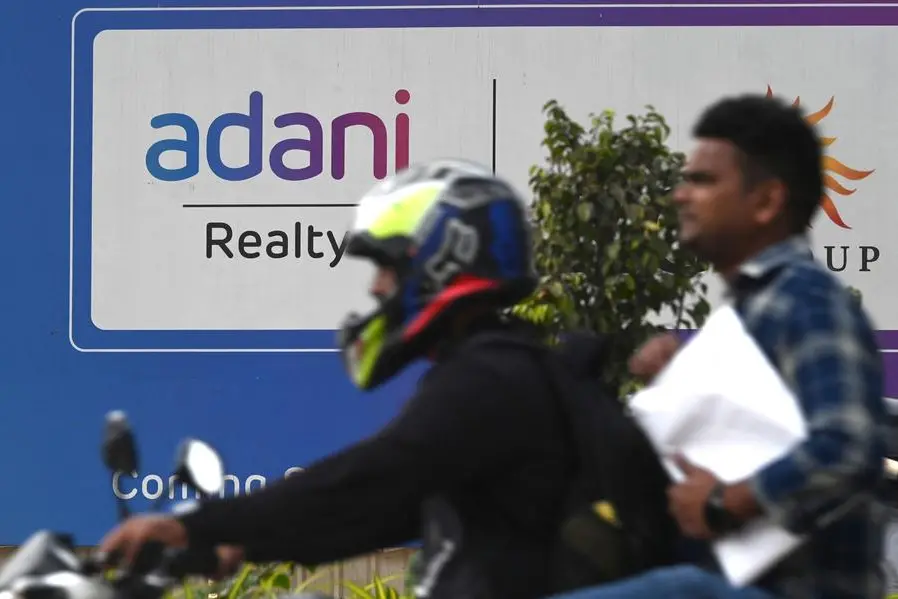PHOTO
The crisis around Indian tycoon Gautam Adani deepened Thursday with the total loss of value to his indebted empire topping $100 billion after it abruptly cancelled a stock sale.
The going up in smoke of more than a third in value of the billionaire's conglomerate follows allegations of accounting fraud on January 24 by US short-seller Hindenburg Research.
Flagship firm Adani Enterprises dived more than 25 percent on Thursday on top of an almost 30-percent drop Wednesday.
Other listed Adani units were subject to trading halts after falling as much as 10 percent, including Adani Total Gas in which France's TotalEnergies has a 37.4-percent stake.
Further panic has seen big banks including Credit Suisse and Citigroup stop accepting Adani bonds as collateral for loans to private clients, according to Bloomberg News.
This raised worries about how Adani will raise fresh funds, with Adani dollar bonds trading at distressed levels and signs of contagion in Indian markets increasing, Bloomberg reported.
The latest blow came after Adani late Wednesday cancelled a $2.5-billion stock sale meant to help reduce debt levels -- long a concern -- restore confidence and broaden its shareholder base.
The issue failed to attract "mom and dad" retail investors and only sold out thanks to large institutional buyers, fellow Indian moguls and $400 million from the United Arab Emirates' IHC.
The Adani Enterprises board said in a statement that going ahead with the issue "would not be morally correct" and that it would refund all payments.
- 'Strong' fundamentals -
Adani himself insisted in a video statement that the "fundamentals of our company are very strong, our balance sheet is healthy and assets robust".
"Once the market stabilises, we will review our capital market strategy," he said, stressing that its record on paying back debt was "impeccable".
Adani, a 60-year-old publicity-shy school dropout, has seen his operations expand at breakneck speed, with Adani Enterprises shares soaring more than 1,000 percent over the past five years.
Until last week, he was the world's third-richest man. By Thursday he had slipped down to 16th place in the real-time Forbes rich list.
According to Hindenburg Research, Adani artificially boosted the share prices of its units by funnelling money into the stocks through offshore tax havens.
This "brazen stock manipulation and accounting fraud scheme" is "the largest con in corporate history", Hindenburg said.
Adani said it was the victim of a "maliciously mischievous" reputational attack and issued a 413-page statement on Sunday that it said showed Hindenburg's claims were "nothing but a lie".
Hindenburg, which makes money by betting on stocks falling, said in response that Adani failed to answer most of the questions raised in its report.
Critics say Adani's close relationship with Prime Minister Narendra Modi, who is also from Gujarat state, has helped him win business and avoid proper oversight.
- Parliament adjourned -
Analysts say the turmoil has hurt India's image just as it seeks to woo overseas investors away from China.
Independent markets commentator Srinath Sridharan said the crisis was a key test for India's financial regulators.
"Are they asking questions, demanding disclosures? All that is extremely critical," Sridharan told AFP, calling the mayhem a "lesson for India Inc".
India's central bank has asked lenders for details of their exposure to the Adani Group -- whose interests include ports, telecoms, airports, media and coal, oil and solar power -- Bloomberg reported citing unnamed sources.
"Now the question becomes: are they forced to actually go and sell off crown jewels to strategic investors? I would expect that is what Adani will end up having to do," Tim Buckley, an Australian energy analyst who monitors India, told AFP.
Parliament was adjourned on Thursday morning after repeated interjections from lawmakers demanding the government grant a debate on Adani and the level of exposure by public-sector banks and financial institutions.
Other Indian equities have remained steady since Adani's slide and Indian tech minister Ashwini Vaishnaw told Bloomberg TV said he was not worried about a domino effect.
"India has a very broad spectrum of infrastructure companies," he said.
"Whatever blip is there on the stock market is not going to affect the overall economy, I am very sure of that."




















